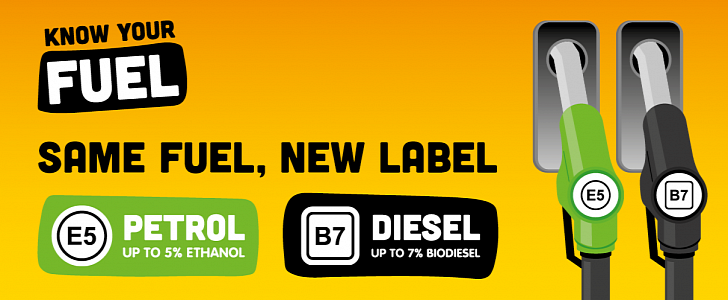Mandatory by September 1st, the E5 and B7 fuel labels are rolling out in gas stations all across the United Kingdom. E5 stands for gasoline with up to 5 percent renewable ethanol while B7 means up to 7 percent of renewable biodiesel.
The E5 label is round and B7 label is square, helping the customer differentiate the two types of fuel a little better than before. As ever, the pistol color is green for gasoline and black for diesel. According to the Department for Transport, fuels labeled as B7 and E10 at the pumps will be introduced at a later date.
“Biofuels supplied in the UK reduce greenhouse gas emissions by over 70% compared to fossil fuels, helping combat climate change.” The DfT is also committed to the Road to Zero Strategy from July 2018, which will end the sale of diesel and petrol-fueled cars by 2040. The United Kingdom isn’t alone in this witch hunt. Norway, for example, plans to phase out internal combustion-engined cars by 2025 while France will ban all fossil fuel production by the year 2040.
“Drivers should be aware of the environmental impact of their travel choices,” said transport minister Michael Ellis. “And seeing this when they are buying fuel can help remind them why decarbonizing transport is so important.” By using biofuels, the DfT estimates a reduction of CO2 emission by 2.7 million tonnes per year. That’s the equivalent of taking 1.2 million cars off the road, but nevertheless, the automotive sector isn’t solely responsible for greenhouse gas emissions.
As the United Kingdom prepares to make internal combustion a thing of the past, the government allocated £2.5 billion to the Transforming Cities Fund. The idea behind the Transforming Cities Fund is to develop public transport schemes in big cities, thus curbing CO2 emissions even further in congested areas such as London, Birmingham, and Manchester.
On an ending note, it should be mentioned that not every passenger vehicle in the United Kingdom is compatible with E10 gasoline. This type of fuel poses serious challenges for old-generation cars, including the corrosion of the carburetors, degradation of flexible fuel hoses, damage to the fuel pump, and blockage of fuel filters. In the UK, as many as 800,000 vehicles can’t utilize E10 because of their antiquated powertrains.
“Biofuels supplied in the UK reduce greenhouse gas emissions by over 70% compared to fossil fuels, helping combat climate change.” The DfT is also committed to the Road to Zero Strategy from July 2018, which will end the sale of diesel and petrol-fueled cars by 2040. The United Kingdom isn’t alone in this witch hunt. Norway, for example, plans to phase out internal combustion-engined cars by 2025 while France will ban all fossil fuel production by the year 2040.
“Drivers should be aware of the environmental impact of their travel choices,” said transport minister Michael Ellis. “And seeing this when they are buying fuel can help remind them why decarbonizing transport is so important.” By using biofuels, the DfT estimates a reduction of CO2 emission by 2.7 million tonnes per year. That’s the equivalent of taking 1.2 million cars off the road, but nevertheless, the automotive sector isn’t solely responsible for greenhouse gas emissions.
As the United Kingdom prepares to make internal combustion a thing of the past, the government allocated £2.5 billion to the Transforming Cities Fund. The idea behind the Transforming Cities Fund is to develop public transport schemes in big cities, thus curbing CO2 emissions even further in congested areas such as London, Birmingham, and Manchester.
On an ending note, it should be mentioned that not every passenger vehicle in the United Kingdom is compatible with E10 gasoline. This type of fuel poses serious challenges for old-generation cars, including the corrosion of the carburetors, degradation of flexible fuel hoses, damage to the fuel pump, and blockage of fuel filters. In the UK, as many as 800,000 vehicles can’t utilize E10 because of their antiquated powertrains.

